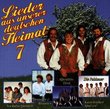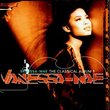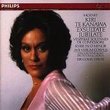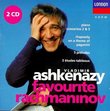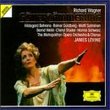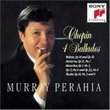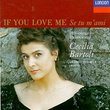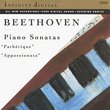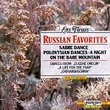PREDICTABLY EXCELLENT
DAVID BRYSON | Glossop Derbyshire England | 12/06/2004
(5 out of 5 stars)
"If forced to it at knifepoint I would probably have to admit that Angela Hewitt's account of the second volume of Bach's 48 doesn't make quite the impact on me that the first did. All the same characteristics are here as before. Everything is 'right', and absolutely nothing should give the slightest problem to anyone who is prepared to accept the piano as an appropriate instrument for Bach. The very first prelude begins with a pedal-point in the bass, and on a modern grand it seems natural and right to me to use a certain amount of sustaining pedal. Elsewhere the pedal is used with tact and restraint, exactly as I had expected; and the part-playing is a model of clarity without exception, exactly as I had expected again. The level of tone that Hewitt uses is natural and unaffected, not played-down in any self-conscious way but with very careful discrimination in building up the volume, as she does to great effect in the fugues in E minor and A minor. As in the first set, she provides her own commentary in the liner, and as before it is nearly as good as the performances themselves. If a performing artist of this stature can write with such unpretentious clarity and helpfulness it may not be too much to hope that certain others will take the hint and learn how the thing can be done.
Where I felt this set was not absolutely the equal of its predecessor was in a certain sense of freshness and alertness. There's not a lot in it, and I'm perfectly open to the possibility that the lack is in the listener rather than in the performer or the recorded quality. She hits completely top form in the fugues in G, G minor and A flat just to take some instances that impressed me particularly, and in a number of the preludes she hints that the player has to be watchful not to let them sound dull -- a danger that nobody listening to her would even suspect, I'm quite sure. To some extent it may be a matter of the steely machine-tooled clarity in the trills and other ornaments that Gould got us used to. Others of the younger generation of Bach pianists are at some pains to replicate this, Hewitt less so, and of course it's arguable how important, even how desirable, this is in the first place.
The preludes in the second set of the 48 are on average longer than those in the first. If they weren't too long for Bach they are certainly not too long for me, and I'm completely behind Hewitt's decision to repeat both halves of the prelude in B flat. One particularly interesting point that Hewitt makes in her commentary is that Bach kept tinkering with these pieces, usually to make them longer, and at several points she tells us where there are variant readings of the score, and why she opts for the ones she does. One has a distinct impression that if Bach had lived longer a number of these masterpieces, seemingly incapable of improvement as we have them, would have been quite significantly different.
The recorded quality is unexceptionable and the piano tone is superb throughout. As in the first volume, a listener new to the works will find here the best and least idiosyncratic introduction to them that I know of. Other great interpreters have a different vision of the 48, but whether there is a better one anywhere I greatly doubt."
A delight to both mind and ear
Alan Lekan | Boulder, CO | 09/14/2005
(5 out of 5 stars)
"ClassicsToday gave a useful summary of this set: "Pianist Angela Hewitt gives wise and lucid attention to these 24 revered Book II preludes and fugues. She never resorts to flashy escapades or overwrought, false romanticisms. She keeps to the basic and sacred demands of Bach's clearly defined script, and it is good. If you like your WTC on the piano, then these musically astute, technically flawless, and interpretively straightforward performances will serve well--easily equaling the well-mannered Schiff (Decca) and elegant Turek (VAI)."
When compared to Book I, Bach's WTC Book II is longer in length, more "serious" in tone overall and greater in compositional scope and complexity. Each disc of Book II is about 73 minutes long, compared to 68 minutes each in Book I. Not quite present in Book II are the more innocent and untroubled preludes from Book I that are most easily recognized. Instead, we are treated to music of grander proportions, sweeping intellect and several fugues possessing daunting tones and daring rhythms (at least for that period). In these minor-key fugues, Hewitt lays down the gauntlet with the full power and temperament from her Steinway that reminds us of Bach's reputed mastery and command of the keyboard. Yet all is not purely intellectual music here: there are several beautiful preludes of endearing tenderness that take sometimes their own sweet time to unfold with Angela Hewitt's trademark lyrical insight, tasteful dynamic shading and ethereal touch. For example in the tuneful Prelude No. 12, Hewitt fully embraces Bach's indications for playing "in a sensitive style" to give a sweet moment of repose. Hewitt's Book II possesses is real depth, intelligence and maturity that makes this set stand out.
Not only is Angela Hewitt the premier Bach pianist of her generation but she is also a premier educator - as seen in her abundent, highly detailed and thoroughly enjoyable liner notes that accompany her CD's. The notes here (really a small book) contains 47 total pages with 16 pages in English. In addition to Miss Hewitt's historical tidbits and pianistic insights, she gives the musical note-figurations for the main motives in each prelude and fugue. She is also famous for helping her audiences more fully appreciate Bach's mastery with some commentary between pieces. In 2007/08, she is taking "Bach's 48" on an ambitious world tour (see angelahewitt.com).
The sound quality seems better here than Book I with nothing to cite as notably deficient: it is clear with bell-like tones from the Steinway in a pristine, "no hiss" and pleasantly-but-slightly resonant recording environment. Still, Hyperion can do better. Accordingly, ClassicsToday rated this work 9/10 for Sound Quality along and 9/10 for Artistic Quality. Additionally, Penguin Guide awarded both of Hewitt's WTC sets a distinguished "Rosette" rating. In short, this set ranks at the top for its musical insight, clarity of voices, tasteful dynamic progressions, beautiful tone and the superlative liner notes that we only wish were a part of every CD we buy. Or as a Gramophone reviewer put it, "Hewitt's Book II is delight to both the mind and ear." Both Vol. I and II are in a brand new limited edition set with a jazzy cover photo of Hewitt and her Fazioli. A wonderful lifetime investment in timeless music."
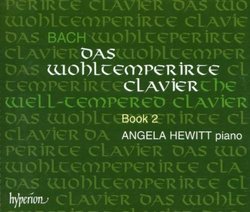

 Track Listings (24) - Disc #1
Track Listings (24) - Disc #1